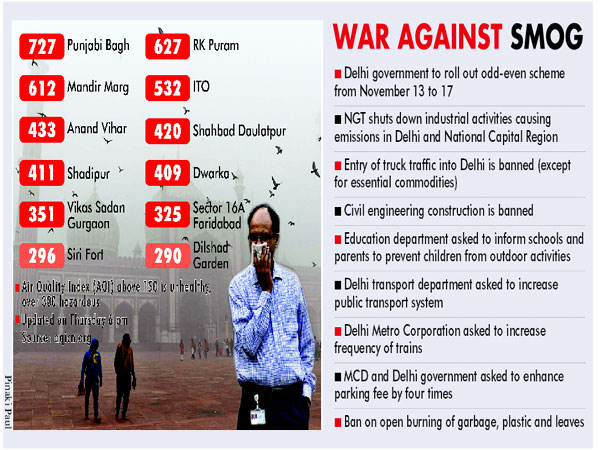
Waking up to the alarming rise in air pollution in the national capital, the authorities have rolled out a multi-pronged strategy, including the tested odd-even scheme for regulating private car use, ban on construction activities and entry of trucks to Delhi except the ones carrying essential items, to deal with the emergency situation.
Thick toxic smog — smoke and fog — hung over the capital city as the air quality index (AQI) worsened by the hour.
AQI crossed 400 (anything above 300 is hazardous) at several places. The Indian Medical Council has called for emergency measures to be in place and demanded that all outdoor sporting activities should be halted immediately.
The weather office has predicted that the situation will remain same for some more days because of lack of wind. A US embassy measure of tiny particulate matter PM 2.5 showed a reading of 608 at 10 am when the safe limit is 50. An hour before it was 591. PM 2.5 is particulate matter about 30 times finer than a human hair. The particles can be inhaled deep into the lungs, causing heart attack, stroke, lung cancer and respiratory diseases.
Declaring pollution emergency, albeit late, the Delhi government said the odd-even scheme will return for five days from November 13-17. The city administration, however, could not escape the wrath of the National Green Tribunal (NGT) that came out with its own order banning entry of trucks and stopping all construction activities. The NGT lambasted the city government for failing to prevent the situation, which has prompted schools to shut down till weekend as the toxic air has become unfit for outdoor activities. Some offices have allowed their employees to work from home to prevent health hazards.
“No construction activity will be carried out on structures until further orders,” said a bench headed by NGT chairperson Justice Swatanter Kumar. It also stopped all industrial activities causing emissions till November 14 in Delhi and the National Capital Region.
Diesel trucks more than 10 years old have been barred from entering the city and no vehicle from outside or within Delhi will be allowed to carry construction material.
The green tribunal slammed the city government as the authorities were told that holding meetings, writing letters and shifting responsibility would not help the situation, which is a bad environmental emergency. The NGT said the officials go to the hospital to see how people are troubled by air pollution.
On its part, the Delhi government announced that the odd-even scheme regulating the use of private cars –tried twice in the capital last year –will return but this time it will be for five days instead of a fortnight.
“It is an emergency situation that is why we are taking these steps. Odd-even will be enforced between 8 am and 8 pm,” said Delhi transport minister Kailash Gehlot.
The Delhi government claimed that all the preparations have been made for the rollout of odd-even plan as public transport services are being strengthened. The government will ensure that app-based taxi services like Ola and Uber do not charge surge price because of the rise in demand during the odd-even phase.
The government is also sticking to the exemptions granted earlier that meant that CNG vehicles, cars driven by women (with only women passengers or children less than 12) and electric/hybrid cars will be kept out of the scheme. The Delhi Transport Corporation will ensure that 500 more buses are added to its fleet to meet with the rising demand.
The Kejriwal government also sought a meeting of chief ministers of neighbouring states to deal with the issue of crop burning, which is one of the major causes of pollution, while the Delhi High Court has suggested that the city administration should try cloud seeding to deal with the crisis. Pulling up the city government, the NGT asked the Delhi Pollution Control Committee to collect ambient air quality samples from different parts of the city and submit details on particulate matter (PM) 2.5 and 10.
— With Reuters inputs




